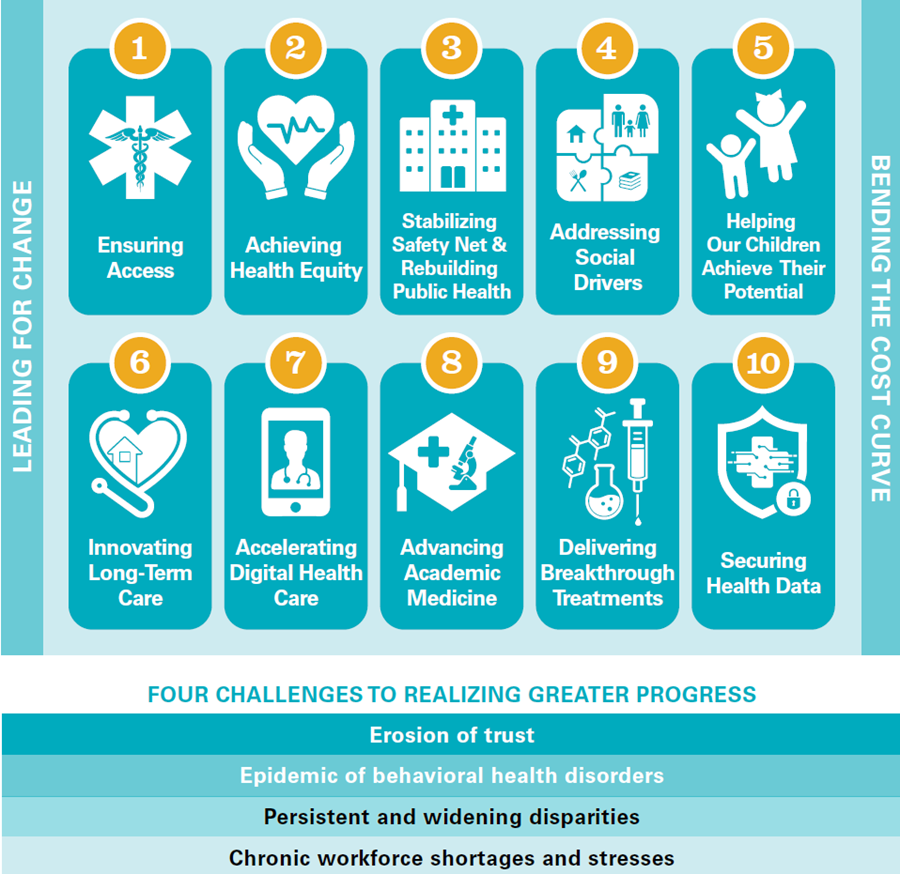Ten Health Care Imperatives for the 2020s: Navigating Through the Surges
Editor’s Note: In January 2021, Manatt Health described the ten health care imperatives essential for improving our health care system and advancing health equity. These imperatives form the core of our health care practice—and are essential to delivering on the promise of a just health care system that will serve everyone with excellence, compassion and fairness. Now two years into the decade of the 2020s, we are, as one health care executive succinctly put it, “living our life in surges.” In light of our new reality, Manatt Health has revisited our ten imperatives, taking a look back at how we’ve progressed—and a look forward at the priorities ahead. The executive summary is below. Click here to download your free copy of the full imperatives report—and watch your email for more information on our upcoming webinar series.
Four challenges to realizing greater progress on the imperatives stand out for Manatt Health as we consider the gains and setbacks that 2021 brought:
- The erosion of trust. Epitomized by both vaccine hesitancy and the politicization of mask-wearing, the erosion of trust in science, public health authorities and health care institutions reached a new and alarming level. Building trust in the communities they serve must be a top priority for all health care leaders.
- The epidemic of behavioral health disorders. The COVID-19 pandemic, with its requirements for social distancing and for remote learning and work, and with its detrimental economic effects, has exacerbated the “shadow epidemic” in America of depression, anxiety, substance use, domestic violence and suicide. During 2021, the devastating milestone of 100,000 annual deaths from overdoses was reached. Creating a new level of capability in the behavioral health system is essential to realizing progress on all the imperatives we have specified.
- Persistent and widening disparities. The long-standing disparities in health care access and quality of care persist and have widened during the pandemic, with AIAN, Black and Hispanic people experiencing two to three times the rates of hospitalizations and deaths as white people. A just health care system must get at, and remedy, the root causes of these disparities, a central emphasis throughout the imperatives.
- Chronic workforce shortages and stresses. The acute shortages of public health and health care workers experienced during 2021 are the tip of the iceberg of a profound and systemic labor crisis. The causes are myriad and include pandemic burnout, job dissatisfaction, regulatory overload and new opportunities for nonclinical staff in the low-unemployment economy. A long-term commitment to improving job conditions for frontline workers is needed to address this impending crisis.
Even considering the enormity of these challenges, important progress was made during 2021 on the ten health care imperatives. Federal and state funding for public health continued to increase, with $7 billion invested through the American Rescue Plan alone. Important gains in Marketplace, Medicaid and CHIP coverage were made. Behavioral health gained national attention and much-needed funding in COVID-19 relief bills. Digital health experiences continued to improve, with a hybrid model combining face-to-face with virtual care becoming the accepted practice. Health system and community engagement expanded as testing and clinical trials continued to be essential components of the pandemic response. Health care leaders across the sector have become highly sensitive to the interconnectedness of social factors and health outcomes and are implementing new measures to address inequities.
Below are the ten imperatives that will shape the decade ahead in health care. Click here to download our new report, examining for each imperative how far we came in 2021—and where we need to focus in the year ahead.
Ten Health Care Imperatives for the 2020s
